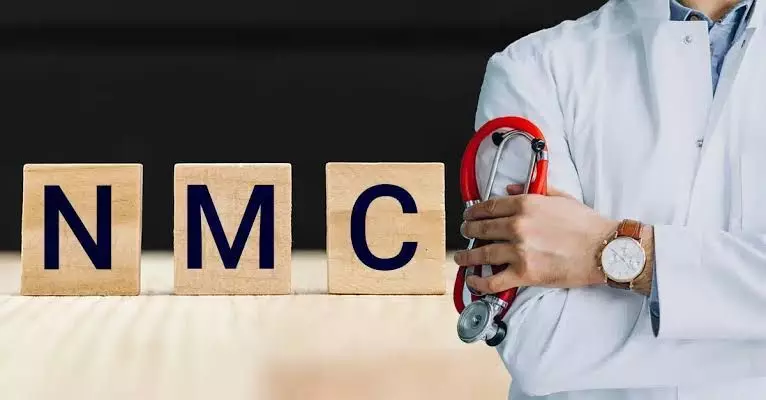NMC allows docs to refuse treatment of violent patients, relatives; bars endorsing drugs or getting gifts
RMPs should not be involved in any third-party educational activity like seminar, workshop, symposia, conference, which involve direct or indirect sponsorships from pharmaceutical companies or the allied health sector.
By Newsmeter Network
New Delhi: The National Medical Commission has allowed medical practitioners to refuse treatment in case of abusive and violent patients or relatives but they must ensure that the patient is not abandoned, a step aimed at checking instances of violence against doctors.
The National Medical Commission (NMC) in the Professional Conduct Regulations also bar doctors from endorsing any drug brand, medicine or equipment, or advertise them.
According to the regulations issued by NMC in a gazette notification on August 2, RMPs (registered medical practitioners) and their families must not receive any gifts, travel facilities, hospitality, cash or monetary grants, consultancy fee or honorariums, or access to entertainment or recreation from pharmaceutical companies or their representatives, commercial healthcare establishments, medical device companies, or corporate hospitals, under any pretext. However, this does not include salaries and benefits that RMPs may receive as employees of these organisations, the regulations stated.
Also, RMPs should not be involved in any third-party educational activity like seminar, workshop, symposia, conference, which involve direct or indirect sponsorships from pharmaceutical companies or the allied health sector. "RMP individually, or as part of an organisation/association, shall not give to any person or to any companies or to any products or to software/platforms, whether for compensation or otherwise, any approval, recommendation, endorsement... concerning any drug brand, medicine, nostrum remedy, surgical, or therapeutic article, apparatus or appliance or any commercial product or article with respect of any property, quality or use thereof or any test, demonstration or trial thereof, for use in connection with his name, signature, or photograph in any form or manner of advertising through any mode nor shall he boast of cases, operations, cures or remedies..." the regulations said.
The regulations state that reasonable estimation of the cost of surgery or treatment should be provided to the patient to enable an informed decision. Consultation fees should be made known to the patient before examination or treatment of the patient. "RMP can refuse to treat or to continue to treat a patient if the fees, as indicated, are not paid. At the same time, this does not apply to doctors in government service or emergencies, but the doctor must ensure that the patient is not abandoned," the regulations stated. The registered medical practitioner, who attends to the patient, will be fully accountable for his actions and entitled to the appropriate fees.
"In case of abusive, unruly, and violent patients or relatives, the RMP can document and report the behaviour and refuse to treat the patient. Such patients should be referred for further treatment elsewhere," the regulations said.
It also specified that use of alcohol or other intoxicants during duty or off duty which can affect professional practice will be considered as misconduct.
According to the regulations, any request for medical records to a RMP responsible for patient records in a hospital either by the patients or authorised attendant has to be duly acknowledged and documents have to be supplied within five working days instead of the existing provision of 72 days.
In case of medical emergencies, efforts should be made to make the medical records available at the earliest.
Efforts shall be made to computerise patient's medical records for quick retrieval and security. Within three years from the date of publication of these regulations, the RMP shall ensure fully digitised records, abiding by the provisions of the IT Act, data protection and privacy laws, or any other applicable laws, rules, and regulations notified from time to time for protecting the privacy of the patient, the regulations stated. Every self-employed RMP shall maintain medical records of patients (inpatients) for three years from the date of the last contact with the patient for treatment, in a standard proforma laid down by the NMC. Also, for the first time, the term emergency has been defined as 'life and limb saving procedure'. Previously, the term emergency was not clearly defined.
The RMP shall display as suffix to his/her name only NMC recognised and accredited medical degrees/diplomas as provided in the nomenclature of the regulations and listed on the NMC website. List of such degrees and diplomas will be on the website and updated regularly.
The RMPs qualified abroad and seeking registration to practice after clearing FMGE/NEXT must use NMC-approved equivalent medical prefixes and suffixes to provide clarity to patients and the public at large. The RMP will be permitted to make a formal announcement in any media (print, electronic or social) within three months regarding starting practice, on change of type of practice, on changing address, on temporary absence from duty, on resumption of practice, on succeeding to another practice and public declaration of charges.
The RMP or any other person, including corporate hospitals, running a maternity home, nursing home, private hospital, rehabilitation centre, or any type of medical training institution, may place announcements in the media, but these should not contain anything more than the name of the institution, type of patients treated or admitted, kind of doctors and staff training and other facilities offered and the fees.
Inputs from PTI